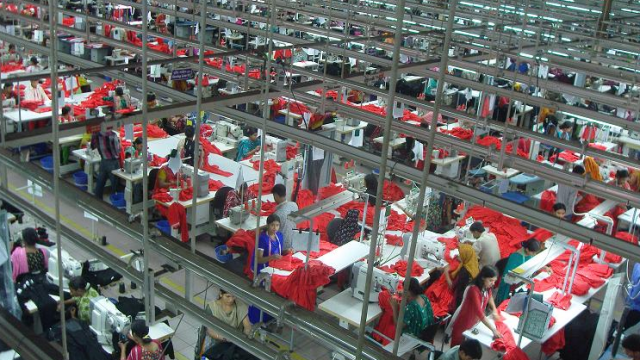Major global fashion brands, factory owners and governments across South Asia are profiting from unpaid labour and systematic repression of garment workers, Amnesty International has said in two new reports documenting widespread violations of workers’ rights in Bangladesh, India, Pakistan and Sri Lanka.
The two reports — ‘Stitched Up: Denial of Freedom of Association for Garment Workers in Bangladesh, India, Pakistan and Sri Lanka’ and ‘Abandoned by Fashion: The urgent need for fashion brands to champion worker rights’ — document widespread anti-union abuse in the garment industry, manifesting in abuses of workers’ rights, harassment and violence by employers. Amnesty International said these abuses underpin the business model of a sector powered largely by underpaid and overworked female workers.
“An unholy alliance of fashion brands, factory owners and the governments of Bangladesh, India, Pakistan and Sri Lanka is propping up an industry known for its endemic human rights abuses. By failing to ensure that the right of garment workers to unionise and collectively bargain is respected, the industry has thrived for decades on the exploitation of a grossly underpaid, overworked and mostly female workforce,” said Agnès Callamard, Secretary General of Amnesty International.
“This is an indictment of the entire business model of the garment industry, which sacrifices the rights of garment workers in Bangladesh, India, Pakistan and Sri Lanka in the relentless pursuit of profits for the shareholders of largely western fashion companies.”
The findings draw on research conducted between September 2023 and August 2024, including 88 interviews with workers, union leaders and labour rights advocates across 20 factories, with more than two-thirds of respondents being women. Amnesty also sent surveys to 21 major international brands to assess their human rights policies and practices; while companies such as Adidas, ASOS, Fast Retailing, Inditex, Otto Group and Primark provided detailed responses, others, including Boohoo, H&M, Desigual, Next and GAP, did not furnish complete information.
The global garment industry has long faced scrutiny over human rights abuses in its supply chains and business model. South Asian workers, especially women, are systematically disenfranchised through informal and insecure contracts, poverty wages, discrimination and precarious work conditions.
Across the four countries, Amnesty documented repeated efforts by authorities and employers to restrict union activities, block strikes and replace independent unions with management-controlled committees. In Bangladesh, workers in Special Economic Zones are barred from forming independent unions and face repression when they protest. Instead, they are allowed only to create welfare bodies with limited powers.
In India, large numbers of home-based garment workers involved in embroidery and finishing are not legally recognised as employees, excluding them from pensions, social protection and union representation. This lack of recognition keeps millions of workers outside basic labour protections.
In Pakistan, the report highlights daily obstacles to obtaining minimum wages and formal work contracts. Underpayment driven by poor oversight is widespread, while the devolution of labour administration and anti-union measures in Special Economic Zones has further curtailed workers’ rights to organise.
Sri Lanka’s free trade zones present similar challenges, with complex administrative requirements making it extremely difficult for workers to register unions. Those who manage to unionise often face harassment, intimidation or dismissal due to inadequate state protection against employer reprisals.
Effective avenues for justice are rare, Amnesty found, due to male-dominated factory structures, weak grievance mechanisms, and state-backed restrictions on unionising. Workers attempting to organise described intimidation and threats of dismissal.
“I was touched physically and abused verbally. No one in management would listen to my complaints. When I asked other women to organise, I was threatened with dismissal many times,” said Sumaayaa, a union organiser from Lahore.
Amnesty International said the findings point to a regional pattern where governments and fashion brands fail to uphold international labour standards, leaving garment workers, most of them women, without meaningful avenues to secure fair wages, safe workplaces or basic rights to association.
International standards such as the UN Guiding Principles on Business and Human Rights and the OECD Guidelines for Multinational Enterprises require fashion companies to identify and address human rights risks across their supply chains.
However, Amnesty said the absence of binding legislation in most garment-producing states has allowed abuses to become entrenched, with governments in the home countries of major brands also failing to prevent violations committed abroad.
Despite all 21 surveyed brands having supplier codes of conduct and human rights policies, Amnesty said independent unions remain “almost entirely absent” from their supply chains. The lack of transparency in global sourcing makes it difficult to determine whether commitments to freedom of association are implemented at the factory level. This gap, the group warned, continues to undermine efforts to prevent, address and remedy violations.
Amnesty said meaningful reform will require governments to guarantee workers’ rights to form unions and bargain collectively, investigate breaches of labour laws, and prosecute employers responsible for violations. It urged states to ensure adequate remedies for affected workers and to hold both domestic and multinational enterprises accountable.
The group also called on global brands to take urgent and concrete action to protect workers in their supply chains, support women’s empowerment and ensure mandatory human rights due diligence. It stressed that brands must reconsider sourcing from locations where workers are denied their rights.




